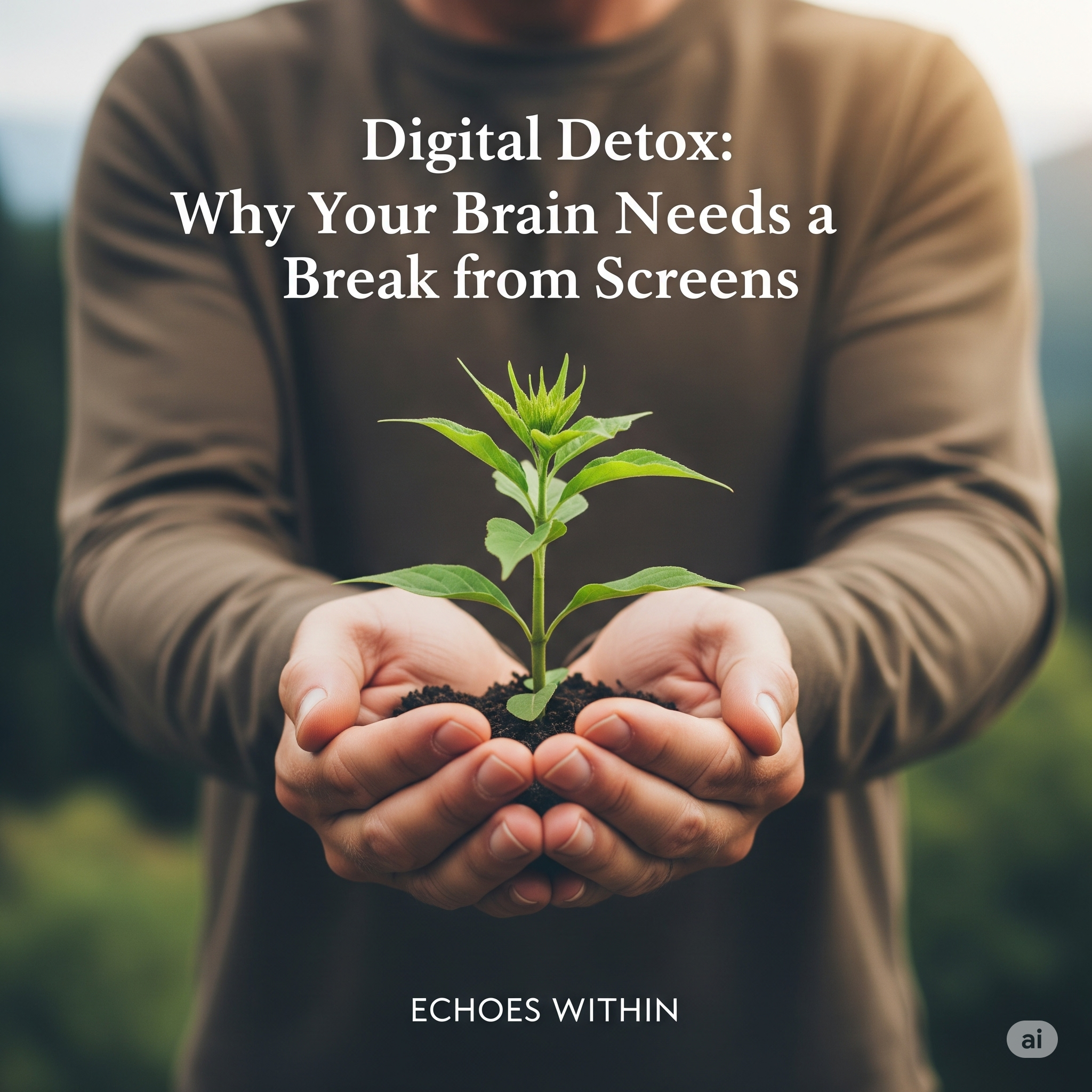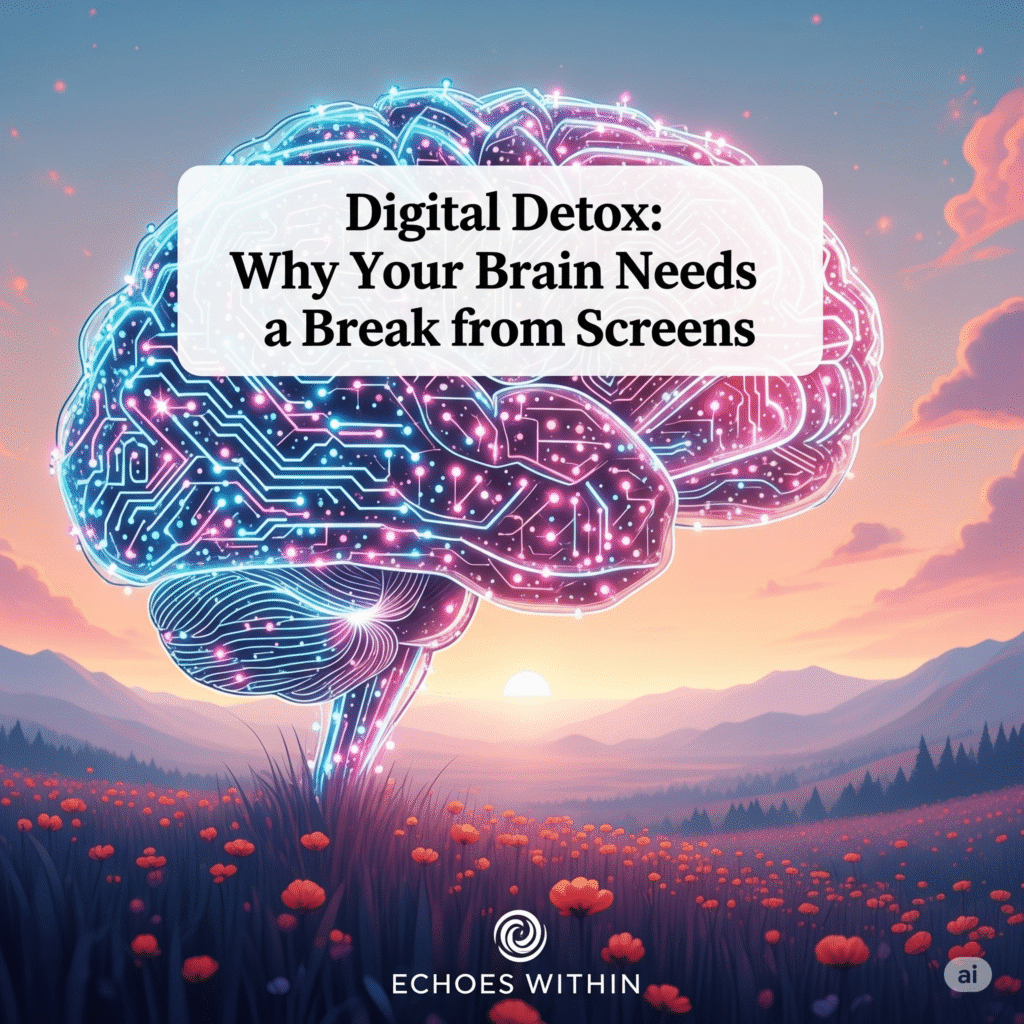We live in a digital world. Every day, we spend hours on phones, laptops, and TVs. We scroll, swipe, tap, and type from morning to night. It feels normal — even necessary. But too much screen time can hurt your brain. If you often feel tired, stressed, or unable to focus, a digital detox may help. This post explains what a digital detox is, why your brain needs it, and how to do it in simple steps.

What Is a Digital Detox?
A digital detox means taking a break from screens. That includes phones, computers, tablets, and even TVs. It can last for a few minutes, a few hours, or even a few days.
During a detox, you step away from apps, games, social media, and messages. Instead, you give your mind time to rest and reset.
✅ Goal: Let your brain relax, refresh, and recharge without digital noise.
Why Your Brain Needs a Break
Too much screen time can cause problems in the brain. Here’s how:
1. It Makes You Mentally Tired
Your brain is always processing information. When you look at screens all day, you never get a break. This leads to mental fatigue — you feel tired, even if you haven’t done much.
2. It Shortens Your Focus
Scrolling through short videos or fast posts trains your brain to want quick changes. This can hurt your ability to focus on one thing for a long time, like reading or studying.
3. It Disrupts Sleep
Using screens late at night can confuse your brain. The blue light tells your brain it’s still daytime. This makes it hard to fall asleep and stay asleep.
4. It Increases Stress
Constant alerts, messages, and news updates can make you feel anxious or overwhelmed. Your brain gets no time to relax or just be quiet.
Benefits of a Digital Detox
Even short breaks from screens can help. Here are some benefits:
-
🧠 Better focus and memory
-
😌 Less stress and more calm
-
💤 Improved sleep quality
-
👀 Less eye strain and headaches
-
🤝 Better relationships with people around you
Your brain will feel lighter and your mood will improve, often within a day or two.
How to Do a Simple Digital Detox
You don’t have to quit screens completely. Just start small. Here are a few easy ways to do a digital detox:
1. Take Screen-Free Mornings
Don’t touch your phone for the first 30 minutes after waking up. Instead, stretch, breathe, or enjoy a quiet breakfast.
2. Try “No-Screen” Hours
Choose one hour each day when you stay away from all screens. Use that time to read, walk, cook, or talk to someone.
3. Create a “Tech-Free” Zone
Make your bedroom or dinner table a no-phone area. This helps your brain connect those places with peace and rest.
4. Turn Off Notifications
Reduce distractions by turning off non-essential alerts. Fewer pings = less pressure to check.
5. Go Outside Without Your Phone
Take a walk without music, podcasts, or calls. Just listen to nature and let your brain breathe.
Final Thoughts
Your brain works hard every day. It handles work, study, emotions, and more. But it wasn’t made to handle screen time 24/7. A digital detox is like giving your brain a mini vacation — a chance to rest and heal.
Start small. Even a few minutes away from screens can make a big difference. Try one tip today and see how you feel. Your brain will thank you.
🔗 You Might Also Like
🧠 Rewire Your Brain for Focus: 3-Minute Daily Practices
📱 The Psychology Behind Mobile Scrolling & How to Stop
📱 Why Modern Habits Are Changing Our Brain
🧘How Modern Habits Are Changing Human Nature
😌The Secret Force Guiding Your Day: Emotion


Pingback: Anger of Housewives: Unveiling the Hidden Fire
Pingback: Ways Children Can Support Their Mothers at Home
Pingback: Can Anger Be Transferred from One Person to Another?
Your article helped me a lot, is there any more related content? Thanks!
Can you be more specific about the content of your article? After reading it, I still have some doubts. Hope you can help me. https://accounts.binance.info/register-person?ref=IHJUI7TF
Can you be more specific about the content of your article? After reading it, I still have some doubts. Hope you can help me. https://accounts.binance.com/es-AR/register?ref=UT2YTZSU
Thanks for sharing. I read many of your blog posts, cool, your blog is very good.